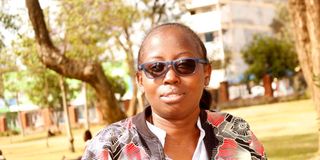Fighting kidney donation myths to save lives

What you need to know:
- The Kenyan law prohibits monetary gain for organ donation and Lucy says this leads to over-reliance on organs donated by kin even as lack of adequate public awareness keeps contributing to a few organ transplants in the country despite the high demand.
- According to the Kenya Renal Association, more than four million Kenyans suffer chronic kidney disease, with a significant proportion of them experiencing kidney failure that requires dialysis or a transplant.
One day in 2013, a heavily pregnant Lucy Kiende was rushed to Nakuru Level Five Hospital, hoping to return home with a bundle of joy.
Little did she know that this hospital visit would mark the beginning of trauma of baby loss and diagnosis with kidney failure.
It was Lucy’s first pregnancy, which had been marked with sickness as the due date approached. At the hospital, doctors discovered she had high blood pressure. They ruled out a caesarean section.
“For two days, I endured the pain of induced labour in vain. The doctors had to make the difficult decision of wheeling me to theatre despite my blood pressure condition,” she narrates.
She lost her baby. For two months, she was in the Intensive Care Unit fighting for her life after severe blood loss.
Lucy would be put on dialysis for two years after which her condition improved. Three years later, she relapsed, upon which she was put back on dialysis.
She would remain on dialysis for three more years until 2021 when her younger brother donated a kidney. “I underwent the transplant at Moi Teaching and Referral Hospital. This marked another cycle of life for me,’’ she recounts with relief from her Kaloleni residence in Nakuru city.
The donation process, though, was not all that easy. When her brother Pius Munene offered to donate one of his kidneys to her, family and friends were skeptical.
Even Lucy herself was reserved, unsure if her younger brother understood the gravity of his decision.
When Lucy began ailing in 2013, Pius was barely 13. Out of love for his sister, he was ready to come to her rescue. Except he could not donate to her at the time since he was underage.
“I promised to donate the kidney to her once I attained 18 years. So when I called her last year informing her that I was ready, she could not believe me.
“Some of my relatives warned that I might die in the process or become a weakling if I survived,” he recounts. Their father too was not ready to lose his children. Unbowed, however, Pius would press on with his plan, and he even consulted doctors to get their views.
The organ harvesting and transplant went well, ending Lucy’s eight-year agony with kidney failure. The experience inspired Lucy to become a community health volunteer on non-communicable diseases in Nakuru County.
She has now set out to tackle misconceptions and stigma around organ donation and transplant, as well as highlighting gaps and challenges in the health system that kidney failure patients often have to contend with.
These days, she walks around Nakuru city, talking to strangers about the disease, her conversations punctuated with medical jargon you would mistake her for a health professional.
Away from street evangelism, Lucy also meets patients in hospitals and in their homes.
She notes that while many Kenyans would like to give or receive a kidney from relatives, myths and mysteries around organ donation stand in their way.
“My brother donated to me despite the resistance he faced from relatives. It is important to be resolute,” Lucy tells Healthy Nation.
She warns that strained relationships with family could lead patients to difficulties in their recovery journey. Through her efforts, two kidney failure patients are lined up for a transplant this year.
“I had to bring my brother to Nakuru from home just to prove to a potential donor that it was safe to give their kidney. ,’’ she narrates.
Dr Ahmed Sokwala, a consultant nephrologist at Aga Khan University Hospital, Nairobi observes that the stigma around kidney transplant is largely driven by lack of awareness.
He notes that a transplant is the best mode of treatment for kidney failure as it comes with lower costs and more effectiveness.
He says while the cost of dialysis can go up to Sh80,000 per month, a kidney transplant beneficiary will require about Sh40,000 for post-transplant care.
He notes that many Kenyans do not know that a person can live a healthy life on one kidney.
“When you donate a kidney, you are saving a life and you will be able to live a normal life. Indeed, research has shown that those who have donated their kidney live longer due to being more conscious of their health.,” Dr Sokwala explains. He observes that prospective donors have to undergo tests to determine their suitability to donate one of their kidneys, hence a donation does not pose any risk.
Donations by living relatives, he says, are preferred to avoid cases where organ donation is done for monetary gain.
According to Parklands Kidney Centre, while there is no upper age limit for living kidney donors, people aged over 18 are preferred. The donor should also be able to provide free and informed consent for surgery.
The Kenyan law prohibits monetary gain for organ donation and Lucy says this leads to over-reliance on organs donated by kin even as lack of adequate public awareness keeps contributing to a few organ transplants in the country despite the high demand.
According to the Kenya Renal Association, more than four million Kenyans suffer chronic kidney disease, with a significant proportion of them experiencing kidney failure that requires dialysis or a transplant.
“Of this number, only about 10 per cent can afford dialysis services. We have less than 10,000 patients on dialysis,” says chairperson of the association Seth Mc’Ligeyo.
In one instance, according to Lucy, a donor demanded Sh2 million from the recipient as insurance just in case the operation failed.
“We need to prioritise public education on organ donation,” she says.
In 2020, 142 kidney transplants were conducted in Kenya, with all organs coming from living donors, data from the Global Observatory on Donation and Transplantation shows. Globally, more than 80,000 transplants were done in the same year, with 25,000 and 55,000 organs coming from living and deceased donors respectively.
[email protected]



